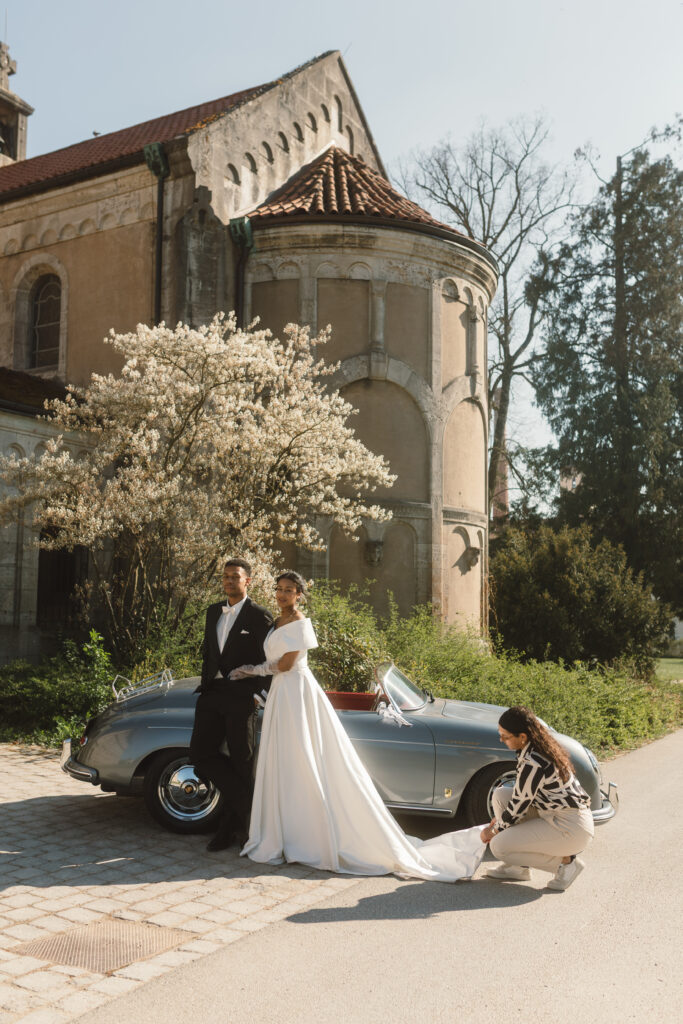Marriage in Bavaria offers many possibilities - from the Barn wedding in the countryside up to the civil wedding ceremony in historic townhouses. But the variety makes the Wedding planning not necessarily any easier. To help you keep an overview, you need a Good structure, Regional knowledge and a clear timetable. In this article you will find Tipshow you use your Wedding in Bavaria efficiently - regardless of whether you have a small celebration or a larger party plans.
Anyone interested in the Marriage in Bavaria decides, should early start planning. The most popular Wedding venues are quickly fully booked, many Service provider work months in advance. This is precisely where it becomes clear how helpful it is to have the Proceduretypical Pitfalls and Regional specialities knows. As Wedding planner I accompany couples regularly through this process - a large part of this Experience is contained in the following sections.



Start planning your wedding in Bavaria early
Who the Marriage in Bavaria should consider the factor Time should not be underestimated. The demand for service providers and locations is high in many regions - especially in the summer months. A structured and timely Wedding planning helps to avoid bottlenecks and make decisions without pressure.
Getting married in Bavaria - timings and booking lead times
For many couples, the planning begins with the search for a suitable date. In Bavaria, it is common for popular Saturdays in the high season to already be 12 to 18 months in advance ausgebucht sind – besonders bei gefragten Locations, Fotografen oder Caterern. Wer hier spät dran ist, muss oft Kompromisse eingehen oder ausweichen. Auch kleinere Dienstleister wie Visagistinnen, Floristen oder Musiker haben häufig Long lead times.
A realistic time frame is therefore essential. Early booking provides security and prevents unnecessary bottlenecks in the later planning phases. A structured schedule helps to maintain an overview and set priorities correctly.
Seasons and regional specialities
Marriage in Bavaria is strongly dependent on the Season dependent. Most weddings take place between May and September. During this time, the weather, light conditions and nature are particularly suitable for free wedding ceremonies or outdoor receptions. Anyone planning outside of these months should pay particular attention to weather-related alternatives: Many venues offer flexible indoor options if booked well in advance.
In rural areas, the availability of service providers is sometimes limited. Here too, the earlier planning begins, the greater the choice. Especially those who value regional providers should enter into dialogue in good time - an experienced Wedding planner knows many of these structures and can coordinate them at an early stage without the bridal couple having to enquire about everything themselves.



Marriage in Bavaria with a clear concept
It's difficult to organise a wedding on the side - especially when it takes place in a region like Bavaria, which is very popular with tourists and wedding couples alike. Without a clear concept, it quickly becomes Double bookings, Budget overruns or a scattered processwhich does not do justice to the actual day. Marriage today means having to make many decisions - a well thought-out concept helps to implement these in a targeted and timely manner.
Wedding - keep an eye on style and budget
Whether modern, rustic, urban or rural - with the Wedding planning In Bavaria, couples should decide early in favour of a Style decide. This will influence all other decisions: from the choice of service providers to the decorations and clothing. If you are planning a minimalist wedding, for example, you will prioritise different things than if you are planning a more classic or relaxed style.
Also the Budget is a central point. In Bavaria, prices vary considerably depending on the region, season and provider. It therefore makes sense to define a fixed cost framework for each area: Catering, Photography, Floristry, Stationery, Music - All of this can be organised well if your own priorities are clear.
Structured budget planning prevents unpleasant surprises. Especially with more complex concepts or special ideas, the support of a Wedding planner can be helpful - especially if realistic assessments and empirical values are lacking.
Structure planning steps sensibly
Many couples start with a mood board and a rough idea - but after the first service provider enquiry at the latest, it becomes clear: without a concrete Timetable planning becomes confusing. Especially when several people are involved or take on subtasks.
A well thought-out structure - for example in the form of a Timetable with checklists - creates clarity. What needs to be done in the first few months? Which contracts need to be signed and when? When do trial appointments make sense? These questions should be clarified in the right order.
A well-structured process not only helps with your own overview, but also with the coordinated involvement of all service providers. This is precisely where the importance of experience becomes clear: a Wedding planner knows the dependencies between the trades and can recognise and compensate for potential bottlenecks at an early stage - without being constantly present or taking control.

Tips for choosing a reliable service provider
A central part of the Wedding planning in Bavaria is the selection of the appropriate Service provider. They not only influence the atmosphere on the day itself, but also the quality of the event. Whether Photography, Music, Floristry or Catering - Those who make the right decisions here avoid unnecessary compromises and can rely on dependable processes. Especially in a region with a large number of offers, it makes sense to proceed in a targeted and systematic manner.
Bavaria - making targeted use of local contacts
Many couples start their search online - which is understandable, but not always the most effective way. Marriage in Bavaria often means working with providers who are already established in the region. They know the processes, Wedding venuesWe also face logistical challenges and often already work together with other service providers on site.
For example, if you book a DJ who regularly performs in certain regions can assume that the set-up, technology and coordination will run smoothly. The same applies to florists, caterers and make-up artists - regional experience saves coordination and ensures smooth handovers.
One Wedding planner usually has a resilient Network and knows what to look out for when making a selection. Recommendations here are not based on commission, but on practical experience and co-operation - a decisive advantage for time-critical or demanding plans.
Recognise and compare quality
Appealing websites or attractive social media profiles say little about the actual reliability of a service provider. It is worth asking specifically for references, work samples or concrete experience. With photographerInside, for example, a full report of a wedding is often more revealing than Instagram highlights. Even with musiciansSound samples or videos are helpful to assess the style and feel of a speech.
Good providers communicate Transparent about prices, services and time frames. They respond reliably, are structured in their communication and bring their own experience to the table. Especially for weddings in Bavaria, where seasonal fluctuations and regional peculiarities play a role Reliability often more important than price or style.
A professional view from the outside can help with the assessment - whether through recommendations, personal contacts or the experience of a wedding planner who has already worked with a large number of service providers.
Professional wedding planning support
Not every wedding requires all-round support. Nevertheless, it often becomes clear during the planning period how complex the many individual parts are. Especially for larger celebrations or customised concepts, a Structured coordination decisive. One Wedding planner provides selective or comprehensive support - depending on requirements. The added value lies less in the assumption of all tasks, but in the Relief at crucial moments.
Wedding planner - support with complex processes
There are many questions associated with the decision to organise a wedding: Who will take care of the schedule? Who will coordinate the service providers on the day itself? What happens if something has to be rescheduled at short notice? These questions can be clarified in advance - provided that someone with experience is involved.
While couples are often planning for the first time, for an experienced wedding planner it is part of everyday life, Realistically assess processesand recognise stumbling blocks at an early stage. This applies, for example, to interfaces between technology, music, catering or even the time planning for getting ready, the couple shoot or the wedding ceremony.
Especially in Bavaria, where many Weddings in the open air or take place in spacious locations, is Good organisation a key success factor. This is where the support of a planner offers a tangible advantage - without dominating the day or dictating decisions.



Coordination in the background on the wedding day
The wedding day itself should not be dominated by phone calls, questions or problems with the organisation. Nevertheless, it regularly happens that individual points do not go as planned - be it due to Delays, short-term weather changes or unexpected failures.
One Wedding plannerwhich operates in the backgroundensures that such situations are dealt with without the bridal couple or guests noticing. She discusses arrangements with the service providers, checks schedules, clarifies open points directly on site - and remains in the background. This creates a Smooth processwithout hectic or unnecessary interruptions.
This Interplay of structure, experience and calm is hard to replace. Especially when couples really want to enjoy the day without having to constantly look at the clock or make decisions.
Weddings in Bavaria with a focus on guest organisation
Planning a wedding doesn't end with service providers and schedules. The Organisation around the guests is a crucial point - especially when Marriage in Bavaria does not take place in the immediate neighbourhood. Many couples celebrate in places that are scenically or emotionally special. For the guests, this often means travelling, an overnight stay and an all-day programme. If you plan early and in a structured way, you make things a lot easier for yourself and those involved.
Wedding in Bavaria - Clarify accommodation and transfer in good time
Many weddings in Bavaria take place in locations that are not directly connected to urban infrastructure - for example in the foothills of the Alps, in the countryside or in smaller towns. For guests, this means that they are dependent on early information about accommodation. Especially when several couples are getting married on the same weekend or it is the holiday season, available hotels are quickly fully booked.
An overview of Nearby accommodation, Holiday flats or Group rooms in guesthouses helps guests with the planning. Depending on the distance to the party location, it also makes sense to organise a shuttle or at least Car pools to organise. If the wedding ceremony and the celebration take place at different locations, the transition should be well planned - including Parking facilities, Timetables, Taxi options or Return services at night. These logistical details may sound minor, but they often determine how relaxed guests experience the day.
Prepare useful process information for guests
Guests want to know when they should be where - and ideally as early as possible. Especially for weddings with several stations or a mixture of indoor and outdoor areas, a Structured schedulewhich contains the most important programme points. It should clearly formulated, clear and be accessible in various ways: e.g. as an enclosure to the invitation, as a website or on a notice board at the event venue.
In addition to times, such a plan can also contain additional information: Are there breaks or time slots for a walk in between? Do you have to move between two locations? Is there a dress code? Are there special instructions for children or older guests? A Sophisticated communication prevents enquiries, uncertainties and delays - especially for larger wedding parties or when guests are travelling from different regions.
Plan a sensible time buffer for weddings in Bavaria
A common mistake when planning a wedding is to schedule it too tightly. However, especially in Bavaria, where weather-related delays, longer journeys or unforeseen incidents can occur, it is important to plan your wedding in advance. time buffers an important planning tool. A few extra minutes between programme items is often enough to avoid stress.
This is not just about delays, but also about space for Flexible reactionsIf the photographer wants to make use of better lighting, if guests linger longer at the champagne reception or if the food is served later. These buffers can be built in unobtrusively - for example between the ceremony and reception, when changing locations or before the evening programme. An experienced planner will automatically factor in such time periods and adjust the programme without guests or the bride and groom noticing.



Checklist for wedding planning in Bavaria
The earlier the planning begins, the more overview can be created. A structured Checklist is not only helpful, but often crucial in order not to lose sight of anything. Especially when Marriage in Bavaria there are many points that are influenced by regional circumstances, suppliers or weather conditions. A well thought-out to-do list brings structure to the process.
Scheduling the wedding: What should be done when:
A clear timetable is the basis of any successful wedding planning - especially when various service providers and external partners are involved. For weddings in Bavaria, this often means starting early, taking seasonal factors into account and calculating realistically. The most important points - such as location, photographer, music, free speakers or catering - should at least 12 months in advance and even earlier for very popular dates.
After these cornerstones comes the detailed planning: stationery, decorations, wedding dress, guest list, schedule, service provider briefings. It is worth setting fixed milestones in the calendar - ideally calculated backwards from the wedding day. If you also work with deadlines for invitations, fittings, feedback or rehearsal dinners, you will create structure and an overview.
Typical pitfalls in wedding planning and how to avoid them
Many mistakes are not caused by carelessness, but by a lack of experience. Often underestimated, for example, are the Dependencies between service providersIf the technical set-up takes longer than planned, the entire evening programme will be delayed. Or if the caterer is not coordinated with the location team, this can lead to logistical bottlenecks.
Another frequent point is the Wrong focus in budget allocation - e.g. spending too much on decorations while other important items are calculated too tightly. Not having a plan B for outdoor weddings or relying on "friends will take care of it" can also cause unnecessary stress afterwards. Structured, realistic planning is the best protection here - with clearly defined responsibilities, backup solutions and a plan that doesn't just work on paper.
Which tasks are good to delegate - and which are not
Not every task has to fall to the bride and groom. On the contrary: good wedding planning recognises early on where it makes sense to delegate. Guest logistics, childcare, music coordination, technical supervision or small surprises for the bride and groom can easily be handed over to trusted helpers. It is only important that these people are involved in good time and receive clear information.
What on the other hand not delegated The most important tasks are complex coordination tasks that require an overall view during the day. These include the timing of the service providers, the smooth running of the ceremony, the change of location areas or the handling of changes in plans. These tasks require an overview, experience and calm behaviour - this is where a Wedding planner in the background the better choice. Not as a director, but as a silent provider of structure.



Conclusion: Getting married in Bavaria - implementing structured wedding planning
Marriage in Bavaria is associated with many possibilities - in terms of landscape, style and organisation. But it is precisely this variety that requires a clear overview. If you plan early, allocate tasks sensibly and set realistic time frames, you will not only create a solid foundation for the wedding day itself, but also for a stress-free preparation time.
Many decisions depend on each other: the choice of location influences the day's schedule, which in turn determines when service providers should be booked. Even seemingly small details - such as transport routes, lighting conditions or guest accommodation - have a noticeable effect on the overall experience. A structured approach prevents important points from appearing too late or being overlooked.
Experience in planning brings clarity here: Which elements need more lead time? Where can buffers be built in? Which tasks can be handed over without losing the overview? If you don't want to go through this process on your own, you have the option of being accompanied at certain points - be it when creating a schedule, when communicating with service providers or on the day of the wedding itself in the background.
If you are considering whether external support would make sense for you, you are welcome to contact us. Non-binding and free consultation to make use of our services. This allows you to quickly assess which form of support suits you and your plans - without any obligation, but with a clear view of what lies ahead.


